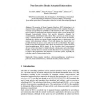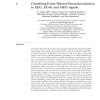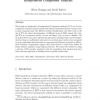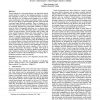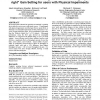60 search results - page 12 / 12 » Rehabilitation with Brain-Computer Interface Systems |
BVAI
2007
Springer
13 years 12 months ago
2007
Springer
The promise of Brain-Computer Interfaces (BCI) technology is to augment human capabilities by enabling interaction with computers through a conscious and spontaneous modulation of ...
DAGM
2006
Springer
13 years 9 months ago
2006
Springer
We present the results from three motor-imagery-based Brain-Computer Interface experiments. Brain signals were recorded from 8 untrained subjects using EEG, 4 using ECoG and 10 us...
IJON
2006
13 years 5 months ago
2006
We present an application of Independent Component Analysis (ICA) to the discrimination of mental tasks for EEG-based Brain Computer Interface systems. ICA is most commonly used w...
HAPTICS
2009
IEEE
14 years 16 days ago
2009
IEEE
Recent findings have shown that humans can adapt their internal control model to account for the changing dynamics of systems they manipulate. In this paper, we explore the effect...
ASSETS
2005
ACM
13 years 7 months ago
2005
ACM
We designed and evaluated an agent that recommends a pointing device gain for a given user, with mixed success. 12 participants with physical impairments used the Input Device Age...
